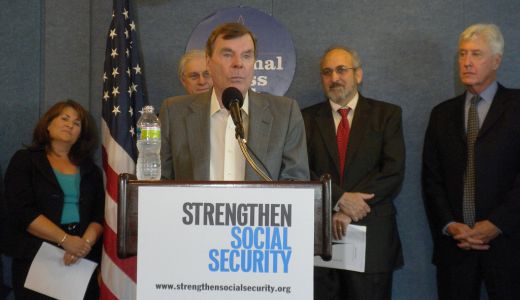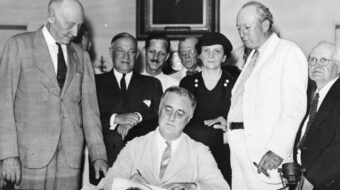
WASHINGTON (PAI) – Labor organizations, including the AFL-CIO, AFSCME, the Service Employees and the National Education Association, joined 59 other groups on July 29 to unveil a mass movement to protect Social Security from an Obama administration-named deficit-cutting commission.
Speakers at a Washington press conference of the coalition, strengthensocialsecurity.org, emphasized the nation’s main retirement system has a cumulative $2.6 trillion surplus – which the rest of the government has borrowed to offset part of its deficit – and that the surplus and benefits it pays for should not be tampered with.
The 60 groups in the coalition, also including the NAACP and NOW, together have millions of members. Leaders promised to make the commission’s threat to Social Security an election issue. Just four – the AFL-CIO, the NEA, SEIU and MoveOn.org – claim more than 20 million members combined. The labor-founded Alliance for Retired Americans (ARA) alone plans 62 events, executive director Ed Coyle said.
AFL-CIO President Richard Trumka added that three other factors caused the huge deficits Obama’s panel is addressing: two wars, the GOP Bush government’s tax cuts for the rich, and “the recession Bush caused.”
Workers “are saying ‘We paid three times (for the deficits) and now you want us to pay for a fourth time?'” Trumka said. “The American public says: ‘Let them (the wealthy) help this time, not us again.'”
The groups’ campaign responds to reports that the 18-member commission has “put everything on the table,” including cutting Social Security and Medicare, in an effort to cut future federal budget deficits.
Any possible action needs the votes of 14 of the panel’s 18 members, who are evenly split between Democrats – including former SEIU President Andy Stern – and Republicans. Obama would then review and modify the recommendations and send them to Congress, where Democratic leaders have promised to vote on them.
“When will they learn?” American Federation of State, County and Municipal Employees President Gerry McEntee sarcastically asked about the deficit-cutters. “That same crowd” which pushed former GOP President George W. Bush’s unsuccessful Social Security privatization plan “want to bring it back. Are they for real? Can you picture all the 70-year-old bricklayers, trash collectors, firefighters and nurses out there? What kind of society do we want?”
Meanwhile, the GOP is floating its own ideas to cut Social Security retirement benefits, including raising the retirement age to 70. When House Majority Leader Steny Hoyer, D-Md., said he would consider that, MoveOn.org mobilized activists in his district to let him know they disapprove, political director Justin Ruben said.
McEntee, whose union set up and funded the groups that led the fight against Bush’s privatization plan five years ago, promised more of the same in this year’s election cycle, as did Coyle. Trumka told PAI afterwards the Save Social Security campaign would be part of the federation’s overall political drive this fall.
“If you break the promise to America’s working families, we’ll hold you accountable,” McEntee warned. “Many groups, including the alliance, will be involved in the 2010 elections, demanding clear, unequivocal answers from the candidates on where they stand on Social Security,” Coyle added.
Raising the retirement age prompted NEA President Dennis Van Roekel, McEntee and SEIU Executive Vice President Eliseo Medina to point out that the average Social Security benefit is $14,000 yearly, or “less than the minimum wage for a full-time worker,” Medina said.
“When families are relying on credit cards to pay for groceries, when families are worried if they’re even going to have a paycheck next month, saving for retirement isn’t even an option,” he said. “The one retirement source we can count on is Social Security.”
Trumka said raising the retirement age to 70 translates to a 13 percent benefit cut, because workers would have to delay retiring. That’s on top of a prior cut imposed on workers born after 1960, who now cannot retire – at full Social Security benefits – until they hit age 67, he pointed out. Combined, the two cuts would be 25 percent, he added.
But at some point, given the retirement of the baby boomers and the government’s borrowing from Social Security, its payments will exceed its income. Asked for ways to solve that problem, close the federal deficit, or both, speakers offered some suggestions: Eliminating the cap, currently $106,000, on the amount of income subject to Social Security taxes, and, most importantly, creating jobs.
Trumka added “actually cutting health care costs, by passing the public option or single-payer health care,” both ideas dropped from Obama’s health care overhaul.
Other union groups in the coalition are the Coalition of Labor Union Women, the Teamsters, the Steelworkers, USW Retiree District 7, CWA’s retirees, the AFL-CIO Building Trades Department, the federation’s Department for Professional Employees, the American Federation of Teachers, the Heat and Frost Insulators, IFPTE, UAW, National Nurses United, ARA and seven locals in Washington state – two of them from UFCW – plus the state federation.
Photo: AFSCME President Gerald McEntee asks, “What kind of society do we want?” at the July 29 press conference. (Alliance for Retired Americans)











Comments